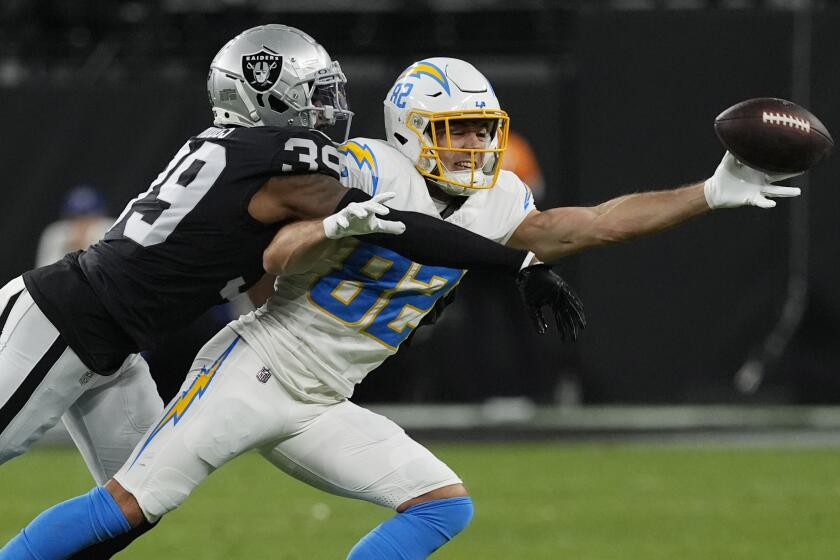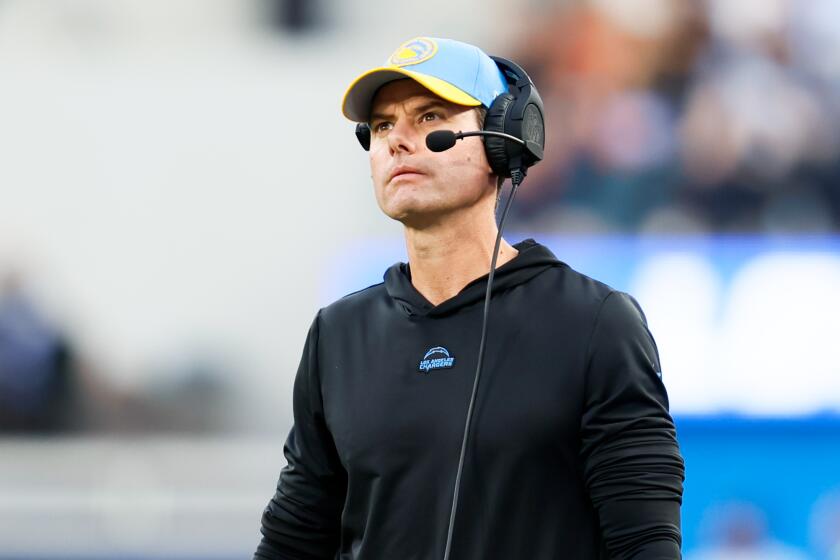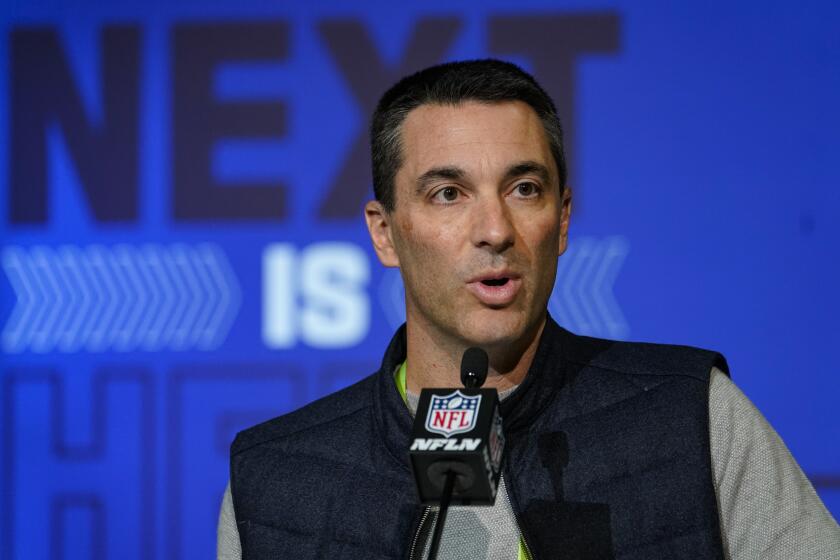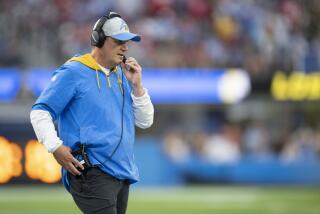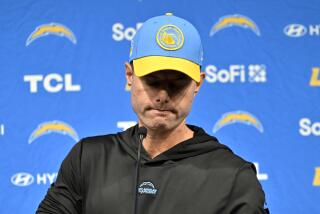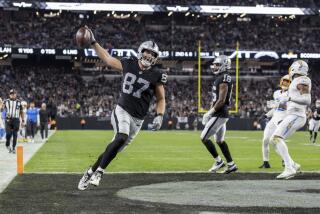News Analysis: Chargers coach Brandon Staley has no defense for team’s failures
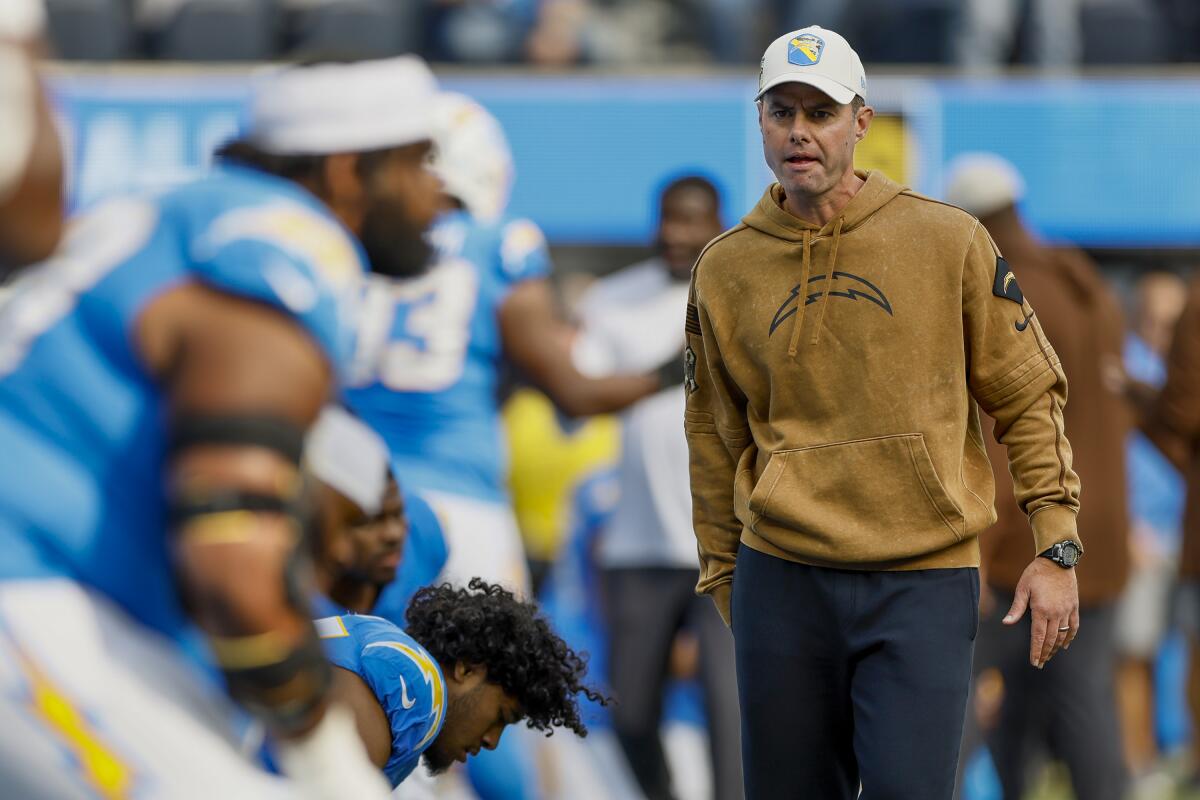
- Share via
The reporter termed it the “Brandon Staley Plan,” the question to Miami Dolphins coach Mike McDaniel framed in a way that suggested he had been outsmarted by the Chargers’ coach when their teams met last December.
That day the Chargers won by controlling time of possession, making Dolphins quarterback Tua Tagovailoa look overwhelmed and holding Miami to 17 points and 219 yards.
A few days before a rematch to open this season, McDaniel was reminded of Staley’s defensive masterpiece. With a chuckle, he basically dismissed the question.
When the opportunity to atone for that loss arrived, McDaniel basically dismissed Staley.
On the first play of the game, edge rusher Joey Bosa was called for offside. In retrospect, there is something supremely appropriate about the Chargers’ defense opening the season by walking backward.
With Easton Stick starting for the injured Justin Herbert and a mistake-prone defense unable to hold back the Raiders, the Chargers lost 63-21.
The next two snaps resulted in 16- and 35-yard Tagovailoa completions, and the demise of the Chargers was under way.
Justin Herbert, Keenan Allen, Austin Ekeler, Mike Williams. The Chargers had enough playmakers on offense entering the season, the hiring of Kellen Moore as coordinator only confirming as much. It was the defense that would determine how far this team traveled. Thirteen games and eight losses later, everyone knows the Chargers are going nowhere.
Obstacles did arise on offense. Ekeler hurt his ankle and Williams his knee. Corey Linsley was lost for the season in late September because of a heart issue. Herbert just had surgery on his broken right index finger, ending his season.
All of which hurt, but none of which torpedoed a season that began with grand expectations based largely on Staley’s belief that he, in his third season as play caller, had built a defense capable of carrying out his vision.
Defense was why the Chargers hired Staley nearly three years ago, his work as coordinator of the NFL-best 2020 Rams the résumé entry that opened this coaching opportunity.
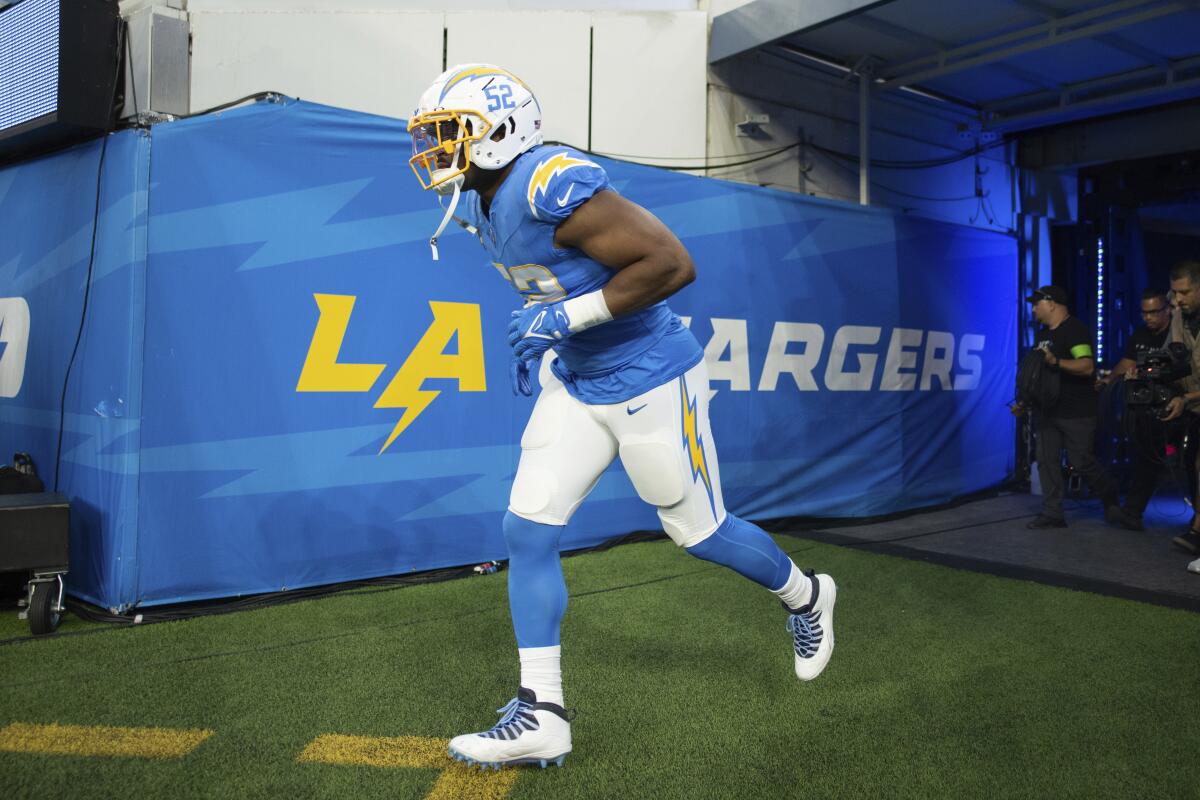
It would be a process overhauling the Chargers’ personnel to fit a scheme players have described as complex and rule-laden, rooted in disguises meant to confuse the opposition.
Along the way, general manager Tom Telesco added pieces such as Khalil Mack, Sebastian Joseph-Day and Morgan Fox — all players Staley had coached. Telesco used high draft picks on Asante Samuel Jr., JT Woods and Tuli Tuipulotu — all players Staley was convinced he could develop.
At Staley’s urging, Telesco signed J.C. Jackson to a free-agent deal that guaranteed the former New England cornerback $40 million.
Throughout training camp this summer, the suggestions about the defense were encouraging. There was talk of increased communication, newfound connectivity and improved depth.
The Chargers continued to falter and now have lost starting quarterback Justin Herbert to injury, proving this franchise needs to clean house.
“In this kind of defense, you need all the guys to be on the same page and seeing the same thing,” safety Alohi Gilman said in August. “That’s what it takes to be successful in this system. I think we have that now.”
Only the Chargers didn’t have that or anything particularly close to that. What they had instead was the NFL’s leakiest pass defense and a group prone to pyrotechnics, surrendering a stunning number of big plays.
The results hinted at a scheme the players couldn’t master or execute at an acceptable level. There was confusion, all right, but mostly among the Chargers .
The face of all that was wrong with Staley’s disjointed defense belonged to Jackson, whose comeback from a significant knee injury went from a feel-good tale to a red-flag alert.
Even before he was injured in October 2022, Jackson seemed out of place . He showed up as too much of an unknown, Staley swayed by Jackson’s interception production with the Patriots.
Keenan Allen, Joey Bosa and Justin Herbert are Tom Telesco’s home runs when examining the general manager’s 10 NFL drafts with the Chargers.
Whatever “intel” the Chargers had on Jackson proved inaccurate to the point where Staley benched him during his first season and made him inactive for a game in his second.
After working so hard to make it back from a ruptured patellar tendon, Jackson was so miscast playing for Staley that he refused to even take the field during Week 4.
A few days later, the Chargers traded Jackson back to New England in a deal that only highlighted just how badly Staley and Telesco whiffed in assembling this group.
NFL Week 15 picks features several matchups key to the playoff races: Commanders-Rams, Cowboys-Bills, Bucs-Packers, Vikings-Bengals, Steelers-Colts.
There were other glaring markers: Ryan Tannehill’s 20-for-24 performance in Week 2, Kirk Cousin’s 367 passing yards in Week 3 and Travis Kelce’s utter destruction in Week 7.
And then came the most bitter and ironic failure for Staley and his defense. In Week 10, Detroit put away the Chargers late by passing on a makeable field-goal attempt in favor of going for it on fourth down.
The Lions converted — much too easily — then drained the rest of the clock and kicked the game-winner, coach Dan Campbell later explaining that he wanted to end the game with the ball.
This was the exact philosophy upon which Staley tried to build his foundation with the Chargers, his fourth-down aggressiveness in 2021 something critics have used against him since.
In Week 15 all went awry, the 5-9 Chargers assuring their first losing record under Staley with an embarrassing 63-21 loss against the rival Raiders.
It has been that kind of year for the Chargers, a year that began with the dismantling of the “Brandon Staley Plan” and continued with the collapse of Brandon Staley’s plans.
More to Read
Go beyond the scoreboard
Get the latest on L.A.'s teams in the daily Sports Report newsletter.
You may occasionally receive promotional content from the Los Angeles Times.

